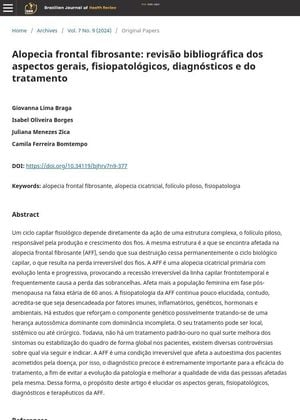Frontal Fibrosing Alopecia: Literature Review of General, Pathophysiological, Diagnostic, and Treatment Aspects
December 2024
in “
Brazilian Journal of Health Review
”
alopecia frontal fibrosante scarring alopecia frontotemporal hairline recession eyebrow loss immune factors inflammatory factors genetic factors hormonal factors environmental factors autosomal dominant inheritance local treatment systemic treatment surgical treatment AFF hairline recession eyebrow thinning immune response inflammation genetics hormones environmental influences genetic inheritance topical treatment oral treatment hair transplant

TLDR Early diagnosis of alopecia frontal fibrosante is crucial, but treatment remains controversial and varies.
Alopecia frontal fibrosante (AFF) is a primary scarring alopecia characterized by the irreversible recession of the frontotemporal hairline and often results in eyebrow loss, predominantly affecting postmenopausal women around 60 years old. The pathophysiology of AFF is not well understood but is believed to involve immune, inflammatory, genetic, hormonal, and environmental factors, with a possible autosomal dominant inheritance pattern. Treatment options include local, systemic, or surgical approaches, but there is no standard treatment that effectively improves symptoms or stabilizes the condition universally, leading to controversies in treatment strategies. Early diagnosis is crucial to prevent disease progression and improve the quality of life for affected individuals. The article aims to clarify the general, pathophysiological, diagnostic, and therapeutic aspects of AFF.






